- Published by:
- Department of Education
- Date:
- 4 Apr 2025
The Early Childhood Update e-newsletter is sent to early childhood teachers and workers, but is open to anyone interested in best practice in early years education and evidence-based teaching approaches. Subscribe here to receive the e-newsletter.
Promoting the benefits of kindergarten ahead of the 2026 enrolment period
Helping you and your service get ready for kindergarten and Pre-Prep enrolments.
Dear colleagues
With Term 1 coming to an end, I would like to thank you for your work in supporting children and families to start the year off smoothly. The beginning of the year can be a time of adjustment as your new learners get used to routines, form friendships and get to know new faces. I hope that everyone has settled in well and you and your colleagues are looking forward to the rest of the year.
I would like to begin by acknowledging your ongoing commitment to ensuring the safety, health and wellbeing of the children in your care. This is our highest priority, and I encourage you to continue referring to guidance from the Quality Assessment and Regulation Division (QARD) on complying with all your regulatory requirements under early childhood legislation and the Child Safe Standards.
As the Victorian Regulatory Authority, QARD takes all notifications seriously, and rigorously investigates serious non-compliance and takes action where required. Notifications can be made anonymously. Please consider subscribing to the QARD newsletter to make sure you receive this information each month.
Recently, it was wonderful to see how enthusiastically attendees embraced the 2025 Best Start, Best Life: Educational Leaders Conference and the 2025 Maternal and Child Health Conference, with MCH and early childhood educational leaders from across the state joining in person and online. If you attended, I hope you enjoyed the opportunity to learn from international experts and connect with colleagues and thank you for taking the time to invest in your professional development and practice.
The opportunity for maternal and child health nurses and early childhood educational leaders to come together is a great example of our vision for children’s care and education in Victoria – to improve outcomes for children and families.
While we’ve welcomed so many new faces at the start of the year, and our focus is on supporting these children and their families through their kinder journey, it’s also time to start looking ahead to enrolments for next year, and I know a big focus for services in the coming weeks will be preparing for 2026 enrolments. This is an exciting opportunity to welcome new families and ensure that children begin their learning journey in the best possible way.
In this month’s edition, you’ll see resources to help you communicate about your service to families and the local community in preparation for the enrolment period. With Pre-Prep continuing to roll out, it is more important than ever to ensure families understand how to enrol and what to expect to receive from your service. We’ve also developed resources to help you respond to any questions you may get from your teams and families about Pre-Prep, which you can find in our Change Management toolkit.
Term 2, 2025, also marks the beginning of Prep enrolments for the 2026 school year. To help families of children in Four-Year-Old Kindergarten to understand the enrolment process and timeline, we are asking you to share resources through your communication channels.
With the Easter and Anzac Day long weekends later this month, I hope you’re able to take a well-deserved break and enjoy some quality time with your loved ones.
Bronwen FitzGerald
Deputy Secretary
Early Childhood Education
Leaders conference explores brain development and the criticality of the early years
Educational leaders from around the state attended the Best Start, Best Life conference in March.
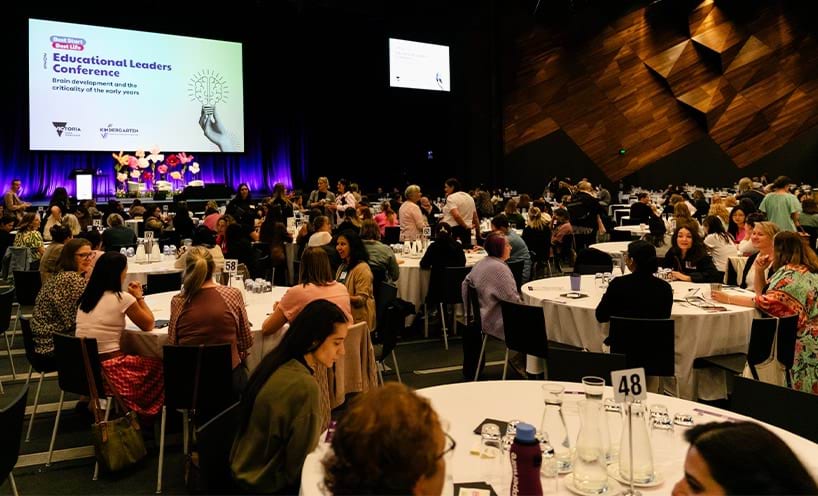
On Friday 28 March 2025, early childhood educational leaders gathered at the Melbourne Convention and Exhibition Centre for our second Best Start, Best Life: Educational Leaders Conference – a day dedicated to learning, collaboration and innovation in early childhood education.
More than 1,500 people attended, as keynote speakers Professor John Spencer and Professor Deborah Phillips explored the conference theme of ‘Brain development and the criticality of the early years’ and presented recent research into neuroscience and teaching practice.
In next month’s edition of the Early Childhood Update, we will share their recorded presentations, which impressed and engaged so many attendees on the day.
‘Professional learning opportunities like these are really important to learn new ideas and bring them back to the team,’ said Lisa Hammonds, director, Wattletree Early Childhood Centre, reflecting the mood of many.
‘It’s been great to connect with so many educational leaders, especially those close to our centre that we can continue this relationship with.’
Another highlight of the conference was the interactive workshop that provided an early showcase of the department’s intentional teaching professional learning program, which is set for release later this year.
Participants were thoroughly engaged in the workshop, praising the tangible demonstration of intentional teaching, including how to improve teacher-child interactions and build subject matter knowledge in literacy and language development.
Keep an eye on next month’s edition for more coverage of this wonderful event, featuring the words of international experts and local leading practitioners.
Find out more
For more information about the conference, refer to Best Start, Best Life: 2025 Educational Leaders Conference.
Next steps for using Arrival
Arrival is a one-stop shop for all kindergarten services to manage data reporting.
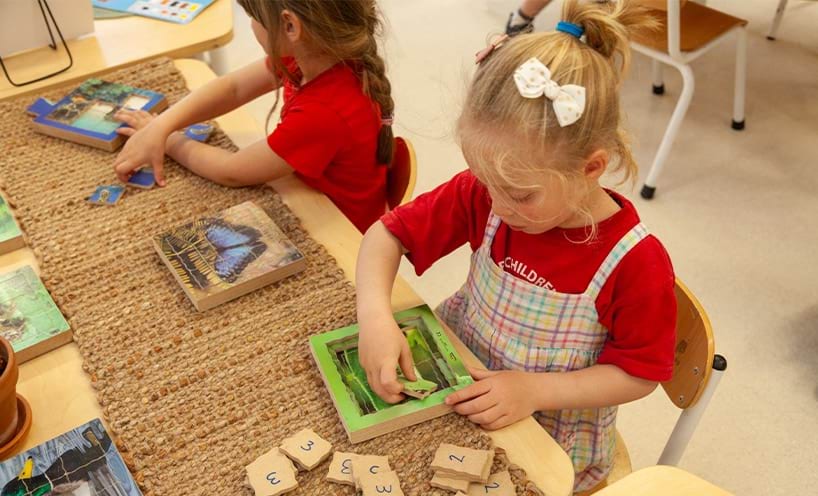
Almost all funded kindergarten services now have access to Arrival and we are working closely with the last few providers.
Annual confirmation
Services should continue to enter all program, teacher, educator and enrolment data into Arrival for annual confirmation.
Attendance data collection
Arrival will provide sessional services that currently use paper-based records with digital sign in and sign out capability. This will make the ‘sign in, sign out’ process easier for families, and tracking and reporting attendance easier for services.
To support the transition to digital sign in, sign out, eligible sessional services are receiving digital devices (tablets) from the department.
Services that have received a device will be contacted by the department in early Term 2 regarding next steps to transition to digital attendance data collection. No action is needed ahead of this.
Collecting attendance data will help guide policy and practice improvements, strengthen kindergarten engagement and participation, and help maximise the benefits of an early childhood education, particularly with the expansion of funded kindergarten programs.
Guidance and support
Guidance and support for using Arrival is available through the ‘Help’ link at the top right-hand corner of your Arrival system screen.
Additional information and resources are available on the Arrival webpages.
Find out more
For technical support when using the system, contact the Arrival Helpdesk:
- phone: 1800 614 810
- email: arrival.helpdesk@education.vic.gov.au
If you have any other questions about accessing Arrival, contact the Arrival Implementation team by email: arrival.implementation@education.vic.gov.au
Disability inclusion research in kindergartens project
View key findings from the first phase of the 2-year research project.
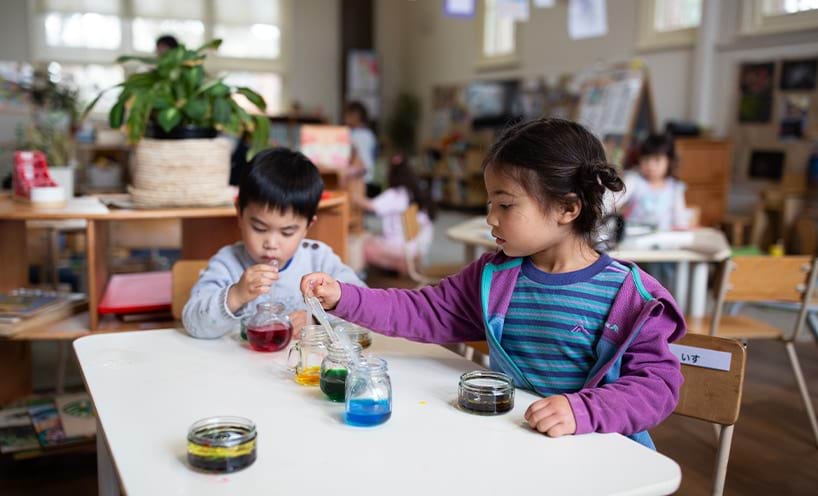
In the August 2024 edition of Early Childhood Update, we introduced the Disability Inclusion Research in Kindergartens project, a 2-year initiative exploring ways to better support children with complex medical needs, disabilities or developmental delays in kindergarten settings.
This research began in 2024 to investigate contemporary approaches to inclusion. Now with the research entering its final year, we’d like to take this opportunity to share the progress made throughout 2024 and key findings from this phase of the project.
What we did
The 2024 research involved:
- conducting the Disability Inclusion Needs survey to better understand the number of children with additional needs and level of support needed across Victorian funded kindergarten programs
- developing and testing a new Kindergarten Inclusion Support Profile (KIS Profile) to help identify strengths, support needs, and required modifications for children with additional needs
- designing options for new systems and supports to help educators, teachers, services and the system provide inclusive education for children with additional needs.
We worked with key stakeholders to develop the KIS Profile, and incorporated research and literature on inclusive education to further refine its design. Read further below for ‘where to next’ in this project.
What we learned
In 2024, key research initiatives looked at enhancing inclusive practices in early childhood education.
We learned a lot more about Victorian children with additional needs in kindergartens. The Disability Inclusion Needs survey was an early step in learning about the range of needs across the early childhood education sector. This helped inform where to focus our improvements.
We were able to develop a new way of considering how to support children that uses strengths-based language and considers the functional needs of children to participate and benefit from engagement. This new tool, the KIS Profile, was tested with more than 100 children across Victoria.
We were also able to consider how to respond to identified needs. We considered a range of options that layer support to equip educators, services and the system with practical strategies for inclusive learning.
Where to next
Research activities in 2025 will build on what we learned in 2024 and include:
- refining and testing an updated KIS Profile with about 200 children and 150 services, please keep an eye out for the opportunity to express your interest in being part of this in Term 2, 2025
- developing and testing options recommended for inclusive education practice supports and guidance to improve the inclusion of children with additional needs
- collecting more data on the level and type of support needs for children with additional needs in funded kindergarten programs.
By working together on this research project, we can create a more inclusive and supportive kindergarten system for all Victorian children.
Find out more
For more information, refer to the Disability Inclusion in Kindergartens research project fact sheet.
For further enquiries, contact the Inclusion Policy and Reform team by email: EC.Inclusion.Research@education.vic.gov.au
Promoting 2026 kindergarten enrolments
Access a new resource to help you promote your service this enrolment period.
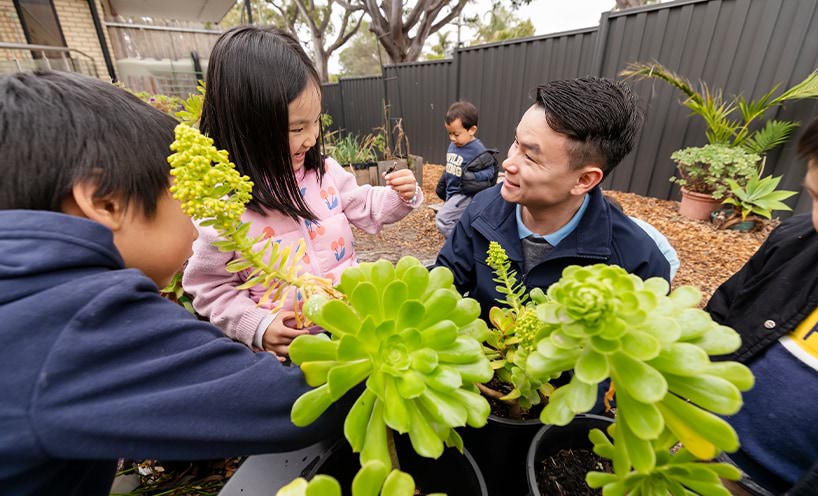
To help you and your service prepare for enrolments for 2026 kindergarten programs, we have developed a 2026 Enrolment communications pack.
The pack will help you to promote the importance of enrolling in kindergarten to your community.
It includes:
- newsletter, website and app sample text
- social media tiles and sample posts
- talking points for conversations with families
- links to further resources.
Ensuring families understand how to enrol and what they can expect to receive from your service is particularly important in 2026 with Pre-Prep rolling out to 12 more local government areas, as well as to children across Victoria who:
- identify as Aboriginal or Torres Strait Islander
- come from a refugee or asylum seeker background
- have had contact with Child Protection services.
The 2026 Enrolment communications pack is available on the Communicating about your kindergarten web page.
There is also a Marketing Toolkit available to help you to promote 2026 enrolments. It includes brochures, posters, postcards, factsheets and social media tiles. You can download these resources or order hard copies from the Victorian Kindergarten Resources Portal.
Further resources
- Kindergarten Sector Guide — key information about the Best Start, Best Life reforms, and the supports available for children to access and take part in kindergarten programs.
- Supporting cultural and linguistically diverse (CALD) families to engage in kindergarten — resources and programs to support communication with CALD families about kindergarten and its benefits, including a guide to support engagement with multilingual families, multiple in-language videos, and information on the CALD Outreach Initiative.
- Change Management Toolkit — information and resources about how to plan and lead your implementation of the Best Start, Best Life reforms, including 4 ‘Your Guide To’ modelling information sheets.
Find out more
For further enquiries, or to provide feedback on these resources, contact the department’s Change Management team by email: bsbl.change.management@education.vic.gov.au
Foundation (Prep) 2026 enrolments open in Term 2, 2025
Access primary school enrolment information and share with families and your community.
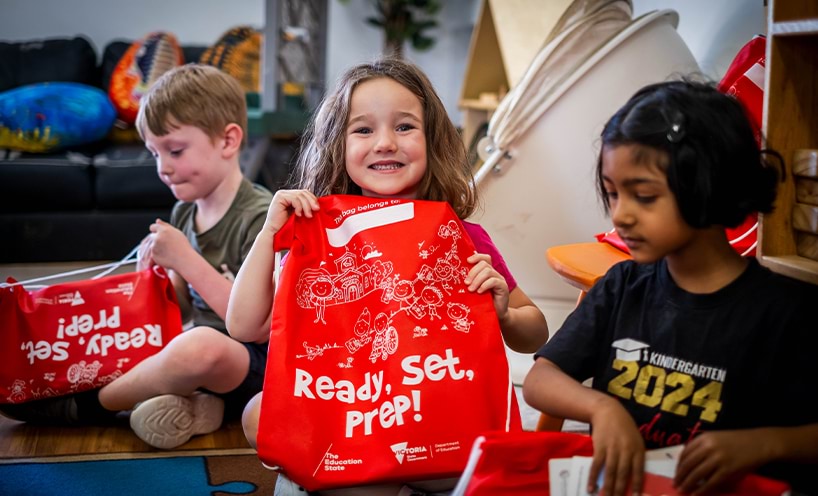
For Victorian government schools, Foundation (Prep) enrolments for the 2026 school year will open from the start of Term 2, 2025, on Tuesday 22 April.
We’re asking parents and carers of children starting school next year to apply to enrol by Friday 25 July 2025.
All Victorian government primary schools will follow this timeline.
We have developed information and resources to make the enrolment process simpler for families, available at Enrolling in Foundation (Prep). This page includes an enrolment information pack for parents and carers, and an application form. A fact sheet and poster are also available in more than 40 languages.
How you can support families
To help families of children in Four-Year-Old Kindergarten programs understand the enrolment timeline, please share resources from the information pack for the early childhood sector. This pack is available at Transition to school resources for families.
This pack has information about the enrolment process to provide to families and staff, with resources including a poster, fact sheet, website content, social media content and newsletter text.
Please share these resources through your own communication channels so families are aware of the timeline and children can get excited about the start of their school journey.
For information about transition to school, refer to moving to primary school, which has resources including:
Find out more
For more information, refer to Enrolling in Foundation (Prep) and Transition to school resources for families.
For further enquiries, contact the senior transition officer in your regional office by email:
- North-east region: enrolments.nev@education.vic.gov.au
- North-west region: enrolments.nwv@education.vic.gov.au
- South-east region: enrolments.sev@education.vic.gov.au
- South-west region: enrolments.swv@education.vic.gov.au
Best Start, Best Life Evening Leadership Series
Register now for the next event in the series on 1 May 2025 to hear from Professor Joce Nuttall on leading change in your service.
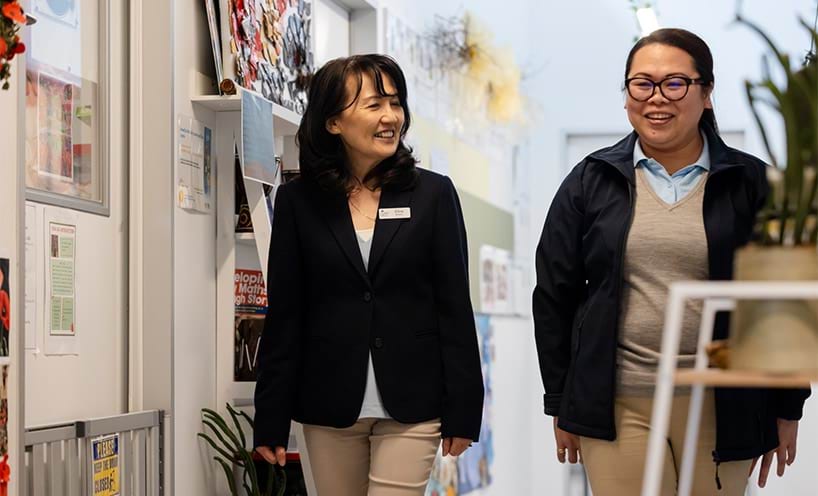
The Best Start, Best Life Evening Leadership Series supports Victoria’s early childhood service and organisational leaders in their continued implementation of the Best Start, Best Life reforms.
The next event, Best Start, Best Life: Leading Change Together, will take place on Thursday 1 May 2025 at the Melbourne Museum, Carlton and will be live streamed for attendees across Victoria.
The session will feature a keynote address from well-known early childhood leadership and change expert Professor Joce Nuttall from the University of Canterbury.
Professor Nuttall has more than 40 years’ experience as a leader, educator and researcher in early childhood. She describes principles for successfully leading change in this Change Management Toolkit video.
Attendees will hear from a panel of early childhood leaders who will share practical insights and strategies on how to plan for and deliver change.
Approved providers, service managers and administrators, peak bodies, early years managers and committees of management are all welcome to attend this event.
Event details
Date: Thursday 1 May 2025
Time: 6 pm to 7:15 pm
Platform: in person (Melbourne Museum, Carlton) or online
Cost: free.
To register, refer to the Best Start, Best Life Evening Leadership Series registration web page.
Registrations close 5 pm Friday 25 April 2025.
Find out more
For more information, refer to Events for service and organisational leaders.
For further enquiries, contact the Practitioner and Leadership Development team by email: ec.forums.networks@education.vic.gov.au
Supports for the early childhood workforce
New guide to help early childhood professionals find the support they need to develop or upskill.
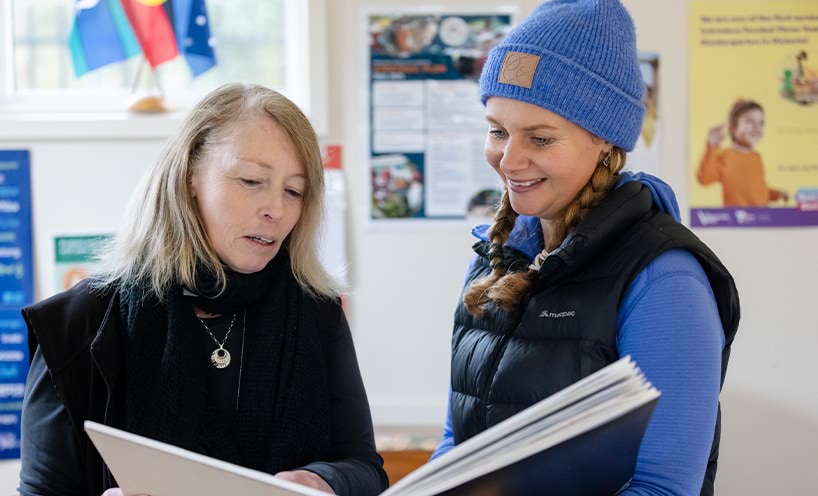
We have developed a new guide to help early childhood professionals navigate a range of funded programs available to support early childhood teachers (ECTs), educators and service leaders.
The Support for the Victorian early childhood workforce guide is divided into 4 sections to make finding the right support easier.
The sections are:
- Supports for early career ECTs and educators
- Supports for experienced ECTs and educators
- Supports for leaders
- Financial supports available.
These supports include professional development and networking opportunities, coaching, upskilling and leadership supports.
The guide features written case studies and links to short videos where early childhood professionals that have accessed the department’s programs share their experiences.
It also includes initiatives led by the Australian Government Department of Education, the Victorian Institute of Teaching and Beyond Blue to provide a high-level overview of the broader range of supports available.
Please share the link to the guide with your networks and encourage them to consider how the supports can help their professional growth and development.
Find out more
For more information about the programs available and to register, refer to the Support for the Victorian early childhood workforce guide.
Respectful Relationships professional learning for early childhood educators
Build your capacity to support children to develop resilience, confidence and healthy relationships.
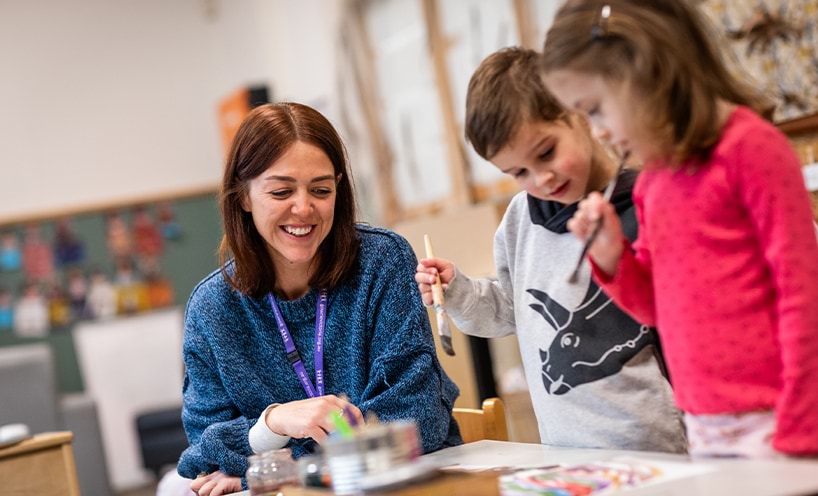
The Respectful Relationships initiative is offering free professional learning for early childhood educators (bachelor, diploma, or certificate III qualified) in Victorian government-funded kindergarten programs.
The online learning program will run from Monday 5 to Friday 23 May 2025. It aims to strengthen the capacity of early childhood educators to:
- promote respectful relationships, positive attitudes and behaviours within their teaching approach, to enable children to build healthy relationships, resilience and confidence
- understand the role of gender equality in the prevention of family violence, and learn practical strategies for promoting gender equality in their teaching practice
- recognise and respond to family violence and build support networks.
About the professional learning program
We developed the professional learning program in collaboration with world-leading experts from Monash University. The program aligns with the Victorian Early Years Learning and Development Framework and the National Quality Standard.
The department is offering a financial contribution to services that need backfill for staff who join this training.
The professional learning program is an item on the School Readiness Funding Menu. Services can also use the menu to arrange for backfill or additional support.
Program details
Dates: Monday 5 to Friday 23 May 2025
Format: online (one full-day workshop, and one 2-hour, self-paced learning module)
Cost: free.
To register, visit: Respectful Relationships in early childhood. Registrations close 5 pm Thursday 22 May 2025.
Find out more
For more information, refer to Respectful Relationships in early childhood.
For further enquiries, contact the Respectful Relationships team by email: respectful.relationships@education.vic.gov.au
Empowering First Nations voices in early childhood education
How First Nations scholar, Charley Bunting, has shaped her early childhood education career by maximising the supports on offer.
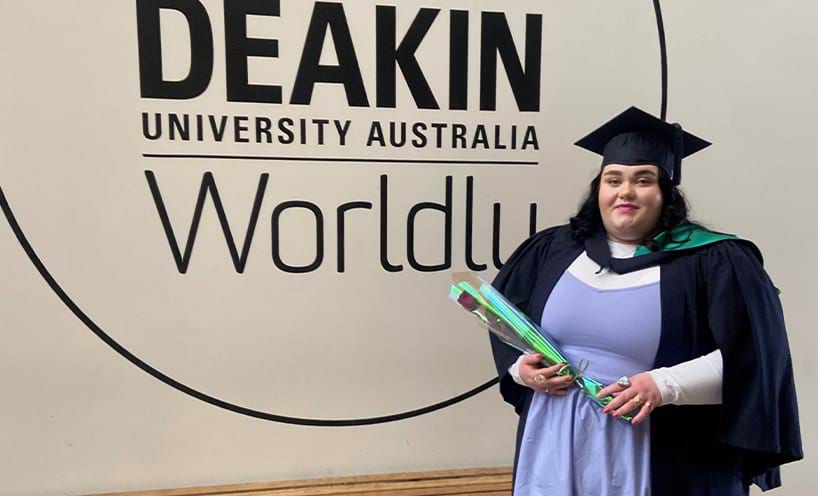
The department offers a range of scholarships and tailored programs to support students to reach their goal of becoming early childhood teachers and educators.
Charley Bunting, early childhood teacher at Bundarra Uniting Kindergarten, combined both financial and non-financial support options by applying for an Aboriginal Pathways Scholarship, while upskilling through Deakin University’s Bachelor of Early Childhood Education program.
Passionate about First Nations voices in education
Charley, a Gunditjmara and Wemba Wemba woman, has worked in the early childhood education sector for many years.
She started her career as a Certificate III educator before commencing study to become an early childhood teacher at Deakin University in 2020.
To support her with her studies, Charley took up the opportunity of the Aboriginal Pathways Scholarship which offers financial support to Aboriginal and Torres Strait Islander students of up to $34,000.
The scholarship is one of a range of options available under the Early Childhood Scholarships Program which provides eligible students with access to additional funds to support them while they study.
‘As a Gunditjmara and Wemba Wemba woman, I believe that it is important that First Nations people can see each other in learning spaces and learn from each other,’ Charley said.
‘The Aboriginal Pathway Scholarship helped me achieve success in completing my studies and becoming a teacher. It enabled me to undertake unpaid placements and buy resources relevant to my studies.’
For Charley, the move into teaching has helped her to fulfil her commitment to connect Victorian children and their families to the importance of First Nations culture and identity.
Charley is one of many Victorian scholarship recipients passionate about early childhood education who completed their qualifications earlier this year. They graduated from courses ranging from vocational diplomas, bachelor degrees and masters programs.
The Early Childhood Scholarship program has awarded more than 5,000 scholarships since 2019.
Achieving her goals
Along with the financial support, Charley also benefited from the academic support provided through Deakin University, one of the tertiary providers now delivering courses as part of the Victorian Government’s Early Childhood Tertiary Partnerships program.
Deakin University offers a range of tailored courses with extra support, including dedicated mentoring, financial incentives for employers and the option to complete placement within your usual workplace.
This was an important advantage for Charley, when choosing the bachelor’s degree with Deakin University as it allowed her to complete her studies online while continuing to work at the Kathleen Millikan Centre.
Charley is proud of her achievement and hopes that others may soon follow the same path.
‘Now I am fulfilling my goal of being an early childhood teacher and supporting children to have the best start to their education,’ Charley said.
Find out more
For more information about the Early Childhood Scholarship program and to apply, visit the Financial support to study and work in early childhood webpage. The program is available to those starting to study and already studying (including those in their final year of study).
For further enquiries, including about eligibility, contact BUSY At Work:
- phone: 1300 161 396
- email: EC.Financial.Support@education.vic.gov.au
For more information about the universities, TAFEs and RTOs offering tailored courses, refer to the Early Childhood Tertiary Partnerships program webpage.
Strengthening leadership skills
How the Victorian Educational Leadership Program was a valuable opportunity for Alison Teece. Registrations for the Term 3 program close 9 May 2025.
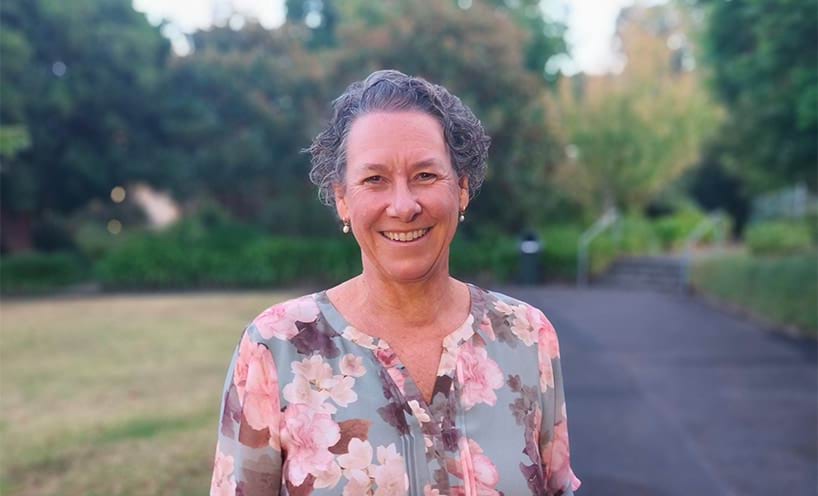
Alison Teece, director and educational leader at Genazzano FCJ College, is a lifelong learner who has looked to strengthen her knowledge many times throughout her career.
Alison applied for the Victorian Educational Leadership Program (VELP) in March 2024 in search of new information and network connections beyond her service and local area.
The VELP is a free program with 2 micro-credential course options available to all educational leaders in Victorian government-funded kindergarten services.
A new foundation for leadership
Alison, who has worked in the early childhood sector for 34 years, said taking part in VELP encouraged her to think critically and deeply about her leadership.
She said she valued the opportunity to engage in discussions that considered different leadership styles and strategies removed from her own service.
‘It was very freeing to think more broadly about leadership and hear from the expertise of the VELP facilitators and experienced sector colleagues working across many different service models,’ Alison said.
Through VELP, Alison started an action research project, which she has continued in her service. This has helped her to translate her learning into practice.
‘Getting started on something unfamiliar is the most uncomfortable part, so having the support to begin was fantastic!’ Alison said.
‘As an educational leader, I could then share my new knowledge and skills with my team, giving me a new foundation for leadership’.
Rejuvenated and re-energised
After completing the VELP, Alison said she felt ‘rejuvenated and re-energised’.
‘I connected with others from across Victoria, and it filled me with new hope to see the wonderful thinking and education happening across our sector’.
Alison is confident that by taking the time re-energise herself with knowledge, she will pass that energy on to her learning community.
Alison encourages educational leaders considering applying for VELP ‘to prioritise you’.
‘Take some time to learn and grow through the VELP,’ she said.
‘The VELP course was a valuable opportunity to add new knowledge and put other pieces together while learning through and with others.’
Find out more
VELP is running again in Term 3, 2025. For more information and to register, refer to Victorian Educational Leadership Program. Registrations close Friday 9 May 2025.